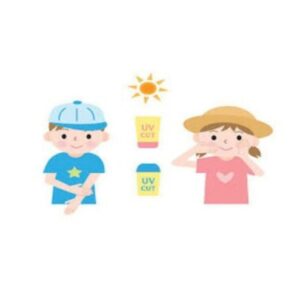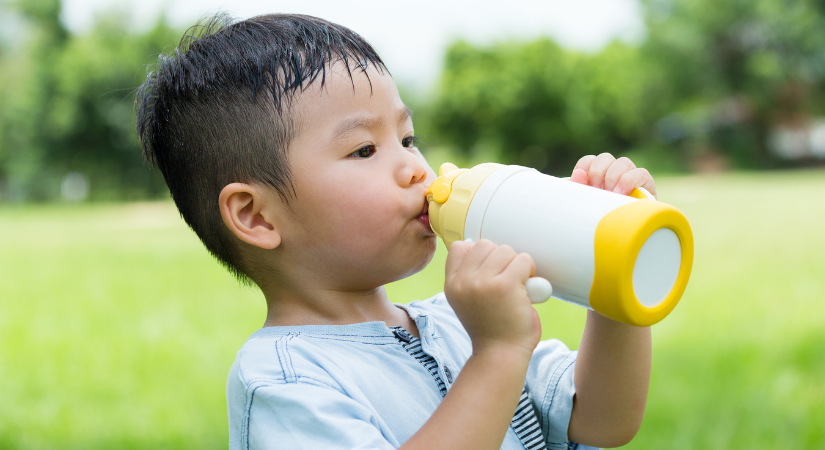When warmer weather makes an appearance, the opportunity to spend time outdoors becomes very inviting. However, how do you keep children safe in the sun and hot weather?
Firstly, children and babies manage heat differently from adults, their ability to cool themselves down is reduced as they produce less sweat and generate more heat when they are active. As a result, they are at higher risk of overheating and developing a heat-related illness and need to be monitored carefully during hot weather. Additionally, heat can exacerbate existing health conditions.
Infant sun safety is crucial to protect them from harmful UV rays and prevent heat-related illnesses. Here are some essential tips to ensure children and babies stay safe in the sun and manage infants in hot weather effectively, both outdoors and indoors.

Implementing Infant Sun Safety Measures Outdoors:
- Shade Provision: Create shaded areas with umbrellas, tents, or use natural shade from trees. Avoid the sun between 10 AM and 5 PM when it’s the strongest.
- Plan Activities: Plan outdoor activities for early morning or late afternoon when it’s cooler.
- Use of Prams: Ensure prams are used safely outdoors by keeping them in shaded areas and avoiding prolonged exposure to direct sunlight.
- Infant sun tan lotion application: Important that infant sun tan lotion is applied to all children. You may request parents to supply their preferred sun cream, ensuring it is suitable SPF, labelled, and in-date. It can be stored in a child’s day bag or on the premises. If provided by the setting, parents should be informed of brand, SPF, and application details, with written permission required for application.

Keep Indoors as Cool as possible
- Utilise Indoor Cooling Methods: Ensure indoor spaces remain comfortably cool, especially during nap times, by utilising fans, air conditioning, or opening windows for ventilation. Additionally, close blinds or curtains to block out direct sunlight. Note: Avoid directing fans directly at children to prevent discomfort.
- Monitor Room temperature: with a thermometer, check infants room temperature, to maintain optimal conditions.
- Promote Breathability: Reduce layers and opt for just a nappy or lightweight clothing during nap time to prevent overheating.
- Use Cooling Measures: If indoor temperatures remain high, consider applying cool damp cloths or towels to the child’s forehead, neck, and wrists. This can effectively help lower their body temperature.
Keep Children and Babies Hydrated
- Frequent Hydration: Ensure children drink plenty of water regularly, even if they don’t feel thirsty.
- Include Hydrating Foods: Incorporate water-rich fruits like watermelon, cucumber, and oranges into their diet.
Monitoring Signs of Infant Overheating
By monitoring children and babies for signs of overheating and taking appropriate action, you can help prevent heat-related illnesses and ensure the safety and comfort of the little ones under your care. Infant overheating symptoms can manifest in various ways, and recognising these signs is crucial for ensuring an infant’s well-being in hot weather.
Here are some common signs of an infant overheating
- Tummy feels hot or clammy to touch
- Flushed cheeks
- Heat rash
- Damp hair
- Rapid Breathing

Consider Creating A Sun Protection Policy
Finally, it might be beneficial to consider creating a sun protection policy to guide your staff and parents. A sun protection policy for early years is designed to ensure infants’ sun safety during outdoor activities, particularly in sunny or hot weather. Implementing such a policy helps minimise risks associated with sun exposure and promotes a safer environment for the children.
Our nursery management software, securely stores important documents like sun protection policies, making them easily accessible for both parents and staff. This feature helps streamline the management and distribution of policies, ensuring that everyone is well-informed and compliant.
Always Seek Medical Attention When Necessary
Prioritising infant sun safety and protection is essential. If you are worried about infant overheating symptoms, do not hesitate to seek medical attention to ensure the best care and protection for the child.
- If a child in your care has persistent symptoms or the systems worsen despite efforts to cool them down, seek medical attention promptly.
- Heat-related illnesses can escalate quickly, so it’s important not to delay medical care if needed.
Knowing the essential steps to take during hot weather is crucial for preventing children from overheating and ensuring effective infant sun protection. We understand that extreme heat conditions can be worrying, but by providing shade, scheduling outdoor activities during cooler times, applying sunscreen, and keeping indoor environments cool, you can significantly reduce heat-related risks.
Learn About How eyworks Can Help
If you would like to learn more about how eyworks can help, contact our support team at hello@eywork.co.uk.

